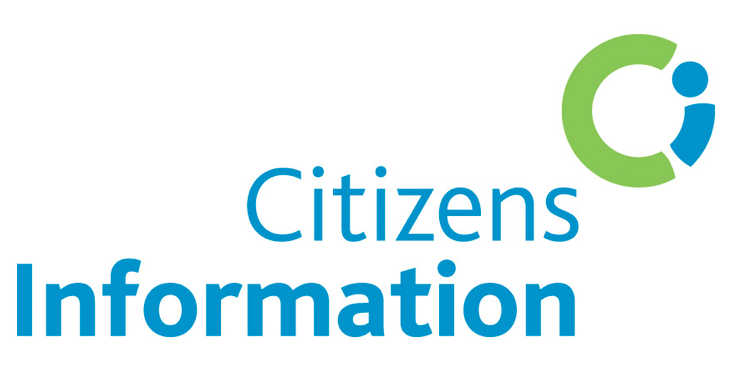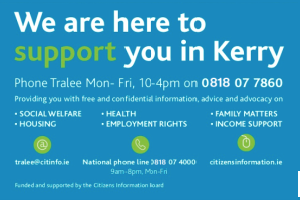 Know Your Rights has been compiled by Kerry Citizens Information Service which provides a free and confidential service to the public…
Know Your Rights has been compiled by Kerry Citizens Information Service which provides a free and confidential service to the public…
Grandparents play an important role in their grandchild’s life. However, some grandparents have difficulty seeing their grandchildren and spending time with them.
They can find themselves excluded from the lives of their grandchildren, and this can be very upsetting for them and for the children involved.
This can happen for many reasons, for example, if the relationship between the grandparent and parent has broken down.
Deirdre Vann Bourke, Kerry Citizens Information Manager, advises; “Grandparents do not have automatic rights in relation to their grandchildren, but there are steps you can take to improve your level of contact with them.”
Continued below…
How do I request more time with my grandchildren?
You should first speak to the child’s parents or guardians. Negotiation should be explored, to try and come to an arrangement so that you can spend time with your grandchildren. If no agreement can be reached, you should consider family mediation.
This is where a trained independent professional, called a mediator, helps you and the parents come to an agreement in a safe space. Mediation addresses the needs and interests of everyone involved.
“Mediation can have better long-term effects on the family as a whole, as both sides take ownership of the arrangement they come to. The process is much less confrontational than the matter being dealt with in court” says Deirdre.
“If mediation is not successful, you can apply to the court for access to your grandchildren and furthermore, in certain situations, you can apply for custody or guardianship.”
Applying for access to a grandchild
If you are having difficulty maintaining contact with your grandchildren, you can apply for access through your local District Court. Access means you will have a legal right to direct contact with the child, which may include overnight stays (sleepovers). Before granting your application, the court will consider:
• Your existing connection with the child
• Any risk of harmful disruption to the child’s life
• The wishes of the child’s parents or guardians
• The wishes of the child if they are capable of forming their own views.
“To make an application for access, you must complete a form called Form 58.19 and submit it to the court. You can download this form from Courts.ie or call into your local CIC to get one.
The court will always put your grandchild’s needs first. The child’s best interests are set out in Section 63 of the Children and Family Relationships Act 2015.
The rules about access are set out in Section 11B of the Guardianship of Infants Act 1964, as amended. You should get professional legal advice before making an application.
Continued below…
Applying for custody of a grandchild
“If you have custody of a child, you are responsible for their day-to-day care, accommodation and upbringing. Any relative, including a grandparent, can apply to their local District Court for custody of a child,” advises Deirdre.
“Usually, the court will only grant you custody if it has the parents’ or guardians’ consent. However, the court can decide that the parents’ consent is not needed if a custody order is in the child’s best interests.
“If you are granted custody of your grandchild and they are to live with you, the court can specify the level of contact, if any, that the child must have with their parent(s). You should get professional legal advice before making an application for custody.”
Kinship care
In some circumstances, grandparents, other relatives or a family friend may take on the full-time care of children and young people, when parents are not able to care for them. Sometimes this is referred to as a private family arrangement or ‘kinship care’.
Most kinship care arrangements are informal unlike relative foster care which is a formal arrangement. Contact a CIC for more details.
Getting financial support
If you are the main carer of the child, and the child is not being properly maintained financially by either or both parents, you can apply to the District Court for a maintenance order. This means that, if the court grants your application, the parent(s) must give you money towards the care of the child.
You may also be eligible to claim the Guardian’s Payment from the Department of Social Protection.
It is not necessary to be a legally appointed guardian. You may get this payment if the child lives with you, and you are responsible for their care.
Becoming a guardian
“Guardianship means you have legal responsibility for certain decisions and to carry out duties in relation to a child’s upbringing. For example, decisions about their medical or dental treatment, or their religious or cultural upbringing.
As a grandparent, or other relative carer, you can apply to your local District Court for guardianship if:
• You have provided the day-to-day care of the child for at least 12 months in a row and
• There is no parent or guardian willing (or able) to carry out guardianship responsibilities in respect of the child
You can also apply for guardianship if the child’s parents die without appointing a guardian in their will. A person can apply for guardianship up until a child reaches 18 years of age.”
To apply for guardianship, you must complete a form called a ‘Notice of application by an eligible person to be appointed a guardian’. This form, which is sometimes called a Form 58.30, can be submitted to your local District Court. You can download this form from www.courts.ie or by contacting your local CIC. You should get professional legal advice before making an application.”
Your guardianship duties
The court will decide the extent of your guardianship rights and responsibilities. You may have the same duties as the child’s parents, or only certain duties. The court can also remove your guardianship rights at a later date if it is in the child’s best interests.
Temporary guardianship
A parent can nominate you to act as a temporary guardian of their child if they are unable to carry out their own guardianship duties – for example, if they become seriously ill or injured.
I was granted access or custody, but still cannot see my grandchild
“If you already have an access order or a custody order from the court, but you are still not getting contact with your grandchild, you can seek an enforcement order from the court. An enforcement order is a further legal instruction to the parents or guardians that they must allow you to see your grandchild, at the specific times set out in the order.
“The enforcement order may allow additional access to compensate for lost time, reimbursement for any wasted expenses or require those involved to attend a parenting programme or counselling.
If the parents or guardians refuse to comply with an access or custody order, they can be fined up to €2,500, go to prison for up to 12 months, or both.”
I was granted access or custody, but my circumstances have changed
“The terms set out in your access order or custody order do not have to last forever” says Deirdre. “If your circumstances change, you can apply to the court for a variation order. This means the court will update some (or all) aspects of the access or custody order. You can also ask the court to cancel the original access or custody order altogether. Contact your local CIC for more details.
Appealing the court’s decision
“The District Court makes decisions about access, custody and guardianship applications based on the child’s best interests. If you are not satisfied with the court’s decision, you can make an appeal within 14 days of the decision being made. To make an appeal, you must complete a form called a ‘Notice of Appeal to District Court’. This form can be downloaded from courts.ie or you can get one from your local CIC. You should get professional legal advice before making an appeal.”
Getting legal advice and other supports
It is important to get professional legal advice before going to court. “Solicitors’ fees can vary considerably so shop around and get some quotes before deciding who to use. Alternatively, you may qualify for Legal Aid.
Another option is FLAC (Free Legal Advice Centres) which is an independent, voluntary organisation that operates a network of legal advice clinics throughout the country. These clinics are confidential, free of charge and open to all. Contact your nearest Citizens Information Centre for information on FLAC services in your area.”
Information and support for grandparents
There is a lot more information available in relation to this subject and various organisations and supports available to you. If you would like more information about any of the issues covered, please telephone or call into your local CIC. Staff will be happy to discuss your situation with you and lay out your options.
• For anyone needing information, advice or have an advocacy issue, you can call a member of the local Citizens Information team in Kerry on 0818 07 7860, they will be happy to assist and make an appointment if necessary. The offices are staffed from Monday to Friday from 10am to 4pm. Alternatively you can email on tralee@citinfo.ie or log on to www.citizensinformation.ie for further information.
………………………………………………………………………………………………………………………………………………………………………………………………………………………………………………………………………………………………………………………………………………………………………………………………………………………………………………………………………………




















